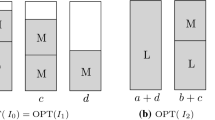Abstract.
A predicate is called approximation resistant if it is NP-hard to approximate the corresponding constraint satisfaction problem significantly better than what is achieved by the naive algorithm that picks an assignment uniformly at random. In this paper we study predicates of Boolean inputs where the width of the predicate is allowed to grow. Samorodnitsky and Trevisan proved that, assuming the Unique Games Conjecture, there is a family of very sparse predicates that are approximation resistant. We prove that, under the same conjecture, any predicate implied by their predicate remains approximation resistant and that, with high probability, this condition applies to a randomly chosen predicate.
Similar content being viewed by others
Author information
Authors and Affiliations
Corresponding author
Rights and permissions
About this article
Cite this article
Håstad, J. On the Approximation Resistance of a Random Predicate. comput. complex. 18, 413 (2009). https://doi.org/10.1007/s00037-009-0262-8
Published:
DOI: https://doi.org/10.1007/s00037-009-0262-8




